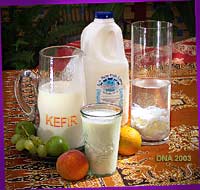
This is a difficult question to answer, but I shall share my personal thoughts and experiences of others, including some research.
Certain individuals find they can comfortably drink between 1 to 4 cups of milk or water kefir each day, either on a continuous basis, or for a certain period of time taking a short break say abstaining over the week end or on a regular basis.
Although I can not see why one can not drink appreciable or acceptable amounts of kefir every day, I personally believe in practicing moderation. I feel that drinking 1 to 2 cups kefir daily 5 to 6 days days per week is preferable for me personally. I would recommend that individuals who wish to drink kefir more regularly than this may benefit from 1 day abstinence from consuming kefir, doing so every 2 weeks or so. However, the actual amount of kefir to take a day is something that each individual needs to find for themselves.
I feel abstaining from all culture-foods during certain periods, to be a wise practice. Possibly the intestinal microflora benefits either directly or indirectly from a short period of abstinence. During abstinence, the body may be able to perform certain functions, that can not be performed or not performed as well if consuming cultured food-products daily, year in and year out. But more importantly, if we focus on the evolution of the microflora of the Gastro Intestinal tract, I feel, may benefit from regular abstinence from culture foods in general. However, if one can include preparing and consuming fresh kefir, and also include ripened kefir, then the evolution of the microflora among the variable kefirs may be an effective means of accomplishing a possibility to consume kefir on a more regular basis; abstaining at longer intervals. Once again, this is what I find is best for me personally. It may not be the same for others, though. The best way is to find what works best for the individual, is by experimenting where possible, while making close observation of how you feel.
The Holy Bible including the Holy Koran recommends to abstain from eat fermented food such as leavened bread during certain times of year, and for a certain period of time. Breads of those days were fermented by natural means, such as what we refer to today as sourdough. Whether or not this is divine intervention or the outcome of the wise ancients with good observation, either way, I take this issue serious enough to follow this recommendation. From personal experience with extensive fasting I’ve performed in my time, the body through the process of fasting, can perform specific functions that benefit the organism as a whole. A somewhat similar process, or a branch off of bodily functions are responsive only where abstaining from fermented foods is involved, I feel. Culture food product although organisms mostly produce beneficial compounds, there are possibly certain compounds produced by friendly organisms, that may impair the human organism, where overindulgence, or too regular indulgence is involved.
END NOTES: For certain individuals such as those inflicted with Candidiasis (yeast infection) who consumed kefir for the first time, even when taking less than half a cup in some cases, have experienced symptoms of nausea, abdominal discomfort and or flatulence shortly after taking milk-kefir. Other individuals with a underlying condition, possibly due to a bad diet where the Gastro Intestinal tract is inflamed or the gastric intestinal microflora is impaired have experienced similar symptoms. Milk kefir is renowned to increase peristalsis, and where a sluggish Gastro intestinal tract with inflammation may be involved, the individual may experience nausea or abdominal discomfort including flatulence shortly after consuming kefir for the first time. This may be an indication of a pre-existing condition, and not kefir being the culprit. In fact, due to a pre-existing condition, the beneficial organisms of kefir, and the compounds those organisms synthesize, are assisting the human organism as a whole by assisting the body to correct the imbalance or bodily dysfunction. While doing so however, the individual may or may not experience discomforting symptoms. This is where in the former, it would be best to take a small amount of kefir at first, and then observe for any symptoms over the proceeding 4 to 24 hours. If symptoms decrease or non existent, one may increase the amount of kefir by 1 tablespoon to 1/2 cup or so more per day, until 1 cup of kefir on its own at one sitting can be enjoyed without experiencing uncomfortable symptoms.
In similar cases, it may be best to begin taking only 1 tablespoon of kefir mixed with 1/2 cup of fresh water or fruit juice, and increase the amount of kefir by 1 tablespoon more taken each day, until reaching a point of taking 1 cup of kefir on its own can be enjoyed without experiencing symptoms due to detox. In most cases, perseverance is the key factor to overcome an underlying or hidden issue, either where immune and or gastric dysfunction is involved. Milk kefir may give a more pronounced benefit but with more pronounced symptoms in this case, while water kefir may or may not have such a pronounced effect. The only way to know for certain, is to try either variety of kefir, and observe closely how the body responds. Uncomfortable symptoms of nausea, abdominal discomfort and wind or flatulence, usually disappear within a non-specific period, the time of which is a case-by-case matter.
